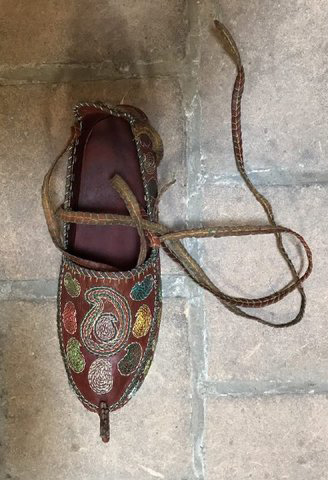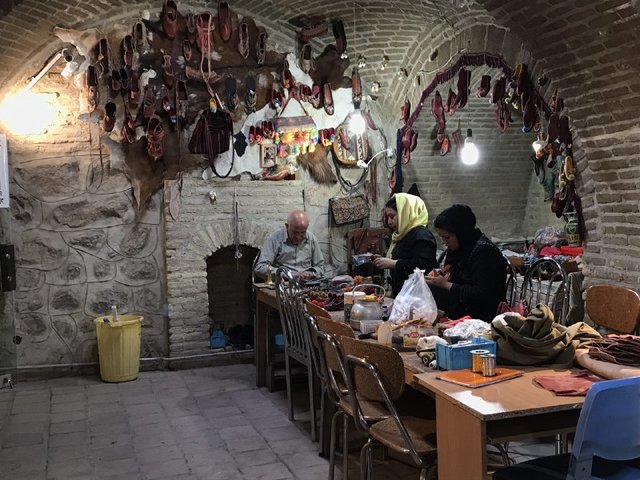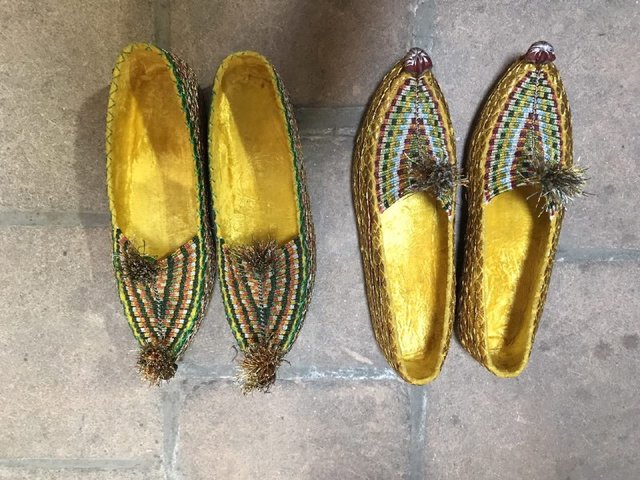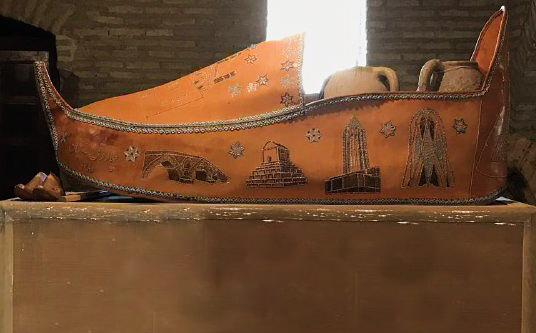IFP - A kind of traditional shoe made of leather is currently sewn in northwestern Iran which is not only regarded as an artwork, but is worth hundreds of dollars.
Mard-Ali Heidari, an old artist and shoemaker, makes a highly valuable kind of traditional leather footwear in the northwestern Iranian province of Zanjan.
 Tourists visiting Zanjan pay between $600 and $1,200 to buy these eye-pleasing and valuable works of art, which are among the most popular handicrafts of the province.
Tourists visiting Zanjan pay between $600 and $1,200 to buy these eye-pleasing and valuable works of art, which are among the most popular handicrafts of the province.
Some 41 years have elapsed since Heidari sewed his first pair of Charouq and now, after all these years, he is still practicing the same profession and has, so far, as a maestro, taught the art to 314 individuals, most of whom are women.
Born in Salmanlu village in Zanjan province in 1956, Heidari lost his father when he was only seven years old and began sewing Charouq in a small shop in the bazaar of his village. There, he used to straighten up curved nails on the shoe soles and heels or wax the threads for shoemaking.
After years of learning the art from the great maestros of his time, he decided to become independent and start his own business.
After a few years of working independently, in 2000, Iran’s Handicraft Organization – which was later merged into the Cultural Heritage, Handicrafts and Tourism Organization of Iran – called upon him to take part in the first Iranian Handicrafts Exhibition held on the sidelines of the 14th General Assembly of the World Crafts Council in Paris, France.
 Having trained a number of students in sewing Charouq at the ICHTO for a while, he returned to Zanjan province and got involved in the same activity, in the historical edifice of Rakhtshooy Khaneh (meaning washing-house in Farsi) which lies at the historical texture of Zanjan city and was built circa 20th century.
Having trained a number of students in sewing Charouq at the ICHTO for a while, he returned to Zanjan province and got involved in the same activity, in the historical edifice of Rakhtshooy Khaneh (meaning washing-house in Farsi) which lies at the historical texture of Zanjan city and was built circa 20th century.
In a Farsi interview with ISNA, he, who still wears Charouq, said, “I have perfected the art of making Charouq. I mean I have sewn any form and type of Charouq [one can think of]. However, I cannot work with the same energy I did in the past and spend most of my time teaching the art.”
 Currently, he, along with his students, is still engaged in practicing the art in Rakhtshooy Khaneh.
Currently, he, along with his students, is still engaged in practicing the art in Rakhtshooy Khaneh.
He has compiled a collection of the photos of his artworks. His works are spectacular. Some of them, worth between $570 and $1,140, are ornamented with filigree designs and some are trimmed with braid. These works very popular with foreign tourists.
Expounding on the properties of Charouq and advantages of wearing this kind of footwear, Heidari said, “Since Charouq is made of natural leather, it absorbs foot sweat. These days, shoes are mostly made of plastic which fails to absorb the sweat. Thus, all the perspiration is sent into the texture of socks.”
World’s Biggest Hand-Made Shoe
He has also sewn the world’s largest Charouq with a length and height of 160 centimetres and 70 centimetres in 18 months. To create the work of art he has used 10 square metres of leather, 500 grams of silk and four kilograms of glue.
 The surface of the artwork is ornamented with pictures of a number of Iran’s historical places such as Dome of Soltaniyeh (Zanjan province), Pasargadae (Fars province), Allahverdi Khan Bridge – popularly known as Si-o-seh pol – (Isfahan Province) and Azadi Tower (Tehran Province). These pictures have been sewn on the artwork with braiding thread.
The surface of the artwork is ornamented with pictures of a number of Iran’s historical places such as Dome of Soltaniyeh (Zanjan province), Pasargadae (Fars province), Allahverdi Khan Bridge – popularly known as Si-o-seh pol – (Isfahan Province) and Azadi Tower (Tehran Province). These pictures have been sewn on the artwork with braiding thread.
On the reason of sewing such a big Charouq, he said, “Women usually throw away their Charouqs after wearing it for a while. Since it is highly likely that no trace of the art would remain or be found in Zanjan province within the next 100 years, I felt the need to sew a decorative Charouq that endures for a long time.”
Heidari, who etches his name on all of his artworks, added, “Charouq is made both for men and women. The ones sewn for women have heels as well as more ornaments on them.”

 QR code
QR code